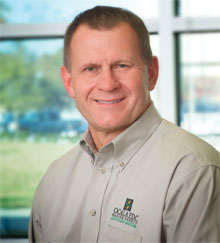
Spring is here and graduation time is upon us. Last year, I had the honor of addressing the graduat-ing class at Marion Technical Institute. Bolstered by the optimism of youth and a good chance to get ahead, those students already had a head start on their peers with education and work experience.
Some of Marion County’s finest firms participate in MTI and have sponsored several internships: Lockheed Martin, MASCO Builder Cabinet Group, Taylor, Bean & Whitaker, Emergency-One, DeLuca Toyota, Ford of Ocala, and MRMC, to name a few. In the packed auditorium, there was genuine ex-citement and revelry for the graduates’ participation in MTI and their working experiences. This, in my opinion, is the very core of the classroom-workplace connection.
As I approached the stage, the thought struck me: What if these companies were not here? What if they weren’t able to hire the best and brightest? Can our community continue to experience eco-nomic growth in the face of advancing globalization?
In his bestseller The World is Flat, Thomas Friedman discussed globalization, or the flattening of the world and stiffening of competition. Will our young people have the necessary education and training to beat that competition—how do we help them prepare?
Lifelong learning is now a requirement and one must constantly upgrade his or her skills. There will be plenty of good jobs out there in the “flat” world for the people with the knowledge and ideas to seize them.
To paraphrase Friedman, there’s a new twist on the conversation my parents had with me. Origi-nally, it was, “Kids, clean your plate because there are people starving in China.” Now I tell my kids, “Finish all your homework because people in China and India are starving for your jobs.”
Freidman also uses an interesting twist on the word “untouchable” and encourages us to become one. Untouchables, in this sense, are people whose jobs cannot be outsourced.
Untouchables come in four broad categories:
1. Special—people like Tiger Woods, Bill Gates, and Oprah Winfrey.
2. Specialized—such as neurosurgeons and machine tool operators.
3. Anchored—professionals like electricians and chefs.
4. Adaptable—workers who are “really adaptable.”
If the U.S., and for that matter Marion County, nurtures a labor force that is increasingly made up of workers who are special, specialized, anchored, or adaptable to higher valued-added jobs, we will grab a slice of that growing globalization pie. But we will have to work at it.
Moody’s, the respected economic research firm, described Ocala’s economic performance as “troubling” in its March 2008 assessment. With a current unemployment rate of 6 percent, the current mortgage meltdown and housing crisis has taken its toll in layoffs and there may be more to come. One of the few industry sectors in the community’s diverse economic structure, manufacturing has taken its share of hits and has shed many higher-paying jobs.
Moody’s reporter stated, “With startlingly low educational attainment, Ocala will be hard pressed to replace these jobs with similar pay.” While the Moody’s economist may not have been completely accurate, he did do some homework.
Can we transfer the energy and enthusiasm for educational excellence and high quality jobs that emanated from the MTI auditorium last spring to the rest of the community? Can we nurture a work-force to keep us economically competitive? The answer must be yes. Our future prosperity depends on it.
Pete Tesch is the President/ CEO of the Ocala/Marion
County Economic Develop-ment Corporation.
His column, “Economically Speaking,” appears
exclusively in Ocala Style four times a year.
Comments? E-mail Pete at pete@ocalastyle.com






